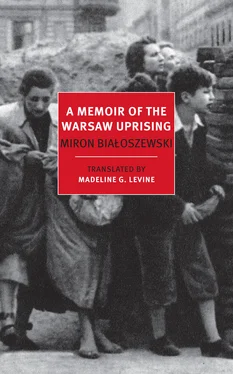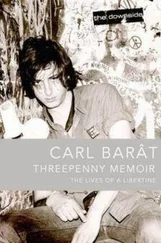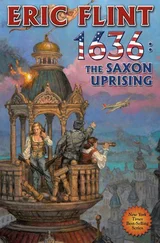Miron Bialoszewski - A Memoir of the Warsaw Uprising
Здесь есть возможность читать онлайн «Miron Bialoszewski - A Memoir of the Warsaw Uprising» весь текст электронной книги совершенно бесплатно (целиком полную версию без сокращений). В некоторых случаях можно слушать аудио, скачать через торрент в формате fb2 и присутствует краткое содержание. Год выпуска: 2015, Издательство: NYRB Classics, Жанр: Биографии и Мемуары, на английском языке. Описание произведения, (предисловие) а так же отзывы посетителей доступны на портале библиотеки ЛибКат.
- Название:A Memoir of the Warsaw Uprising
- Автор:
- Издательство:NYRB Classics
- Жанр:
- Год:2015
- ISBN:нет данных
- Рейтинг книги:4 / 5. Голосов: 1
-
Избранное:Добавить в избранное
- Отзывы:
-
Ваша оценка:
- 80
- 1
- 2
- 3
- 4
- 5
A Memoir of the Warsaw Uprising: краткое содержание, описание и аннотация
Предлагаем к чтению аннотацию, описание, краткое содержание или предисловие (зависит от того, что написал сам автор книги «A Memoir of the Warsaw Uprising»). Если вы не нашли необходимую информацию о книге — напишите в комментариях, мы постараемся отыскать её.
A Memoir of the Warsaw Uprising — читать онлайн бесплатно полную книгу (весь текст) целиком
Ниже представлен текст книги, разбитый по страницам. Система сохранения места последней прочитанной страницы, позволяет с удобством читать онлайн бесплатно книгу «A Memoir of the Warsaw Uprising», без необходимости каждый раз заново искать на чём Вы остановились. Поставьте закладку, и сможете в любой момент перейти на страницу, на которой закончили чтение.
Интервал:
Закладка:
So what next? That time, that entrance was the start of a new, hideously long story of communal life against the background of the possibility of death. What do I remember? Both a lot and a little, and not always in order or day by day. I may confuse the order of some things, the dates (even of events that were rather important, although I have several dates fixed in my mind), the positions of the fronts — both ours and the greater one.
So, I found out that the uprising had caught Aunt Uff. and Zbyszek in a store on Freta Street. A couple of days before we came, life had been transferred from the upper floors to the shelters. Along with everything that could be moved. A neighbor, Bacia, who was deaf but able to speak and sing, only off-key, a woman incorrectly referred to as Baciakowa, brought down her sewing machine and her little son with his legs in a hip-high cast and sewed on that machine in the cellar across from us and sang a lot — Swen laughed — because she could not hear the explosions. The entrance into Baciakowa’s cellar (something that was supposed to be a door but by 1939 was still only a hole) was just one tiny element of the labyrinth under 14/16 Rybaki Street. Because there was an endless number of corridors, cellar rooms with and without pillars, passageways, exits to the staircases, corners, separate vaults, storerooms, bins, subbasements, passages leading to the boiler room with its many pipes and sewer mains. In addition, the two main blocks (A and B) had a connecting passageway, or what was referred to here as the tunnel. Under the garden plots with their pumpkins. And tomatoes. And probably potatoes, which were so much in fashion throughout Warsaw during the occupation that not only the larger and smaller squares (from which in the winter of 1939 those who had been hastily buried in September were exhumed), not only the embankments but even Aleje Jerozolimskie were planted and blossomed with potatoes in July.
Our cellar “hall” appeared to be the main one for this block even though there were two or three others just like it under block B. After all, the altar was located here. And perhaps it really was the largest? Perhaps. Near the door, that is, near the entrance opening from the stairwell on the right, stood a barrel full of water in case of fire. On August 7 the water was no longer very fresh. Later it produced a stench, quarreling, and the decision to change the water in the barrel by means of a bucket brigade. The door led to the corridors, half cellars, passageways with goats, dogs, stoves over which the women quarreled incessantly and the men were always ready to fight with axes. The second axes in this uprising. From there, stairs led directly from the cement floor to the ground floor upstairs. Immediately to our left were the toilets (the plumbing was still functioning for the time being), everything was in working order, even the lights. Here dusty rays of sunlight shone in from above so that once they had entered early in the morning they shone like that for several hours every day, because the weather was always sunny. Here were the most important comings and goings, meetings, discussions, my sitting on a heap of bricks, and writing.
The cellars began again across the way. A whole new chain of them started over there. Later, this was our famous walking trail. People would go for strolls over there. And it wasn’t the same as on the surface. It was here. After all, these were streets, squares, crowds, life, the making of friendships.
Let us return to the date. Swen had fled here with Celinka the day before I had. At five o’clock on August 1 they’d been outdoors, near Chmielna Street. They had run with their arms raised among the tanks on Nowy Świat, it seems. Celinka had her own room, 1 °Chmielna. And it was there that the living together of many people, entangled, yet separate from one another, commenced. Communal living en masse. But what was there to eat? How long would it last? For a couple of years Swen’s mother, older, experienced, had been hiding rusks in sacks. So Swen brought Celinka over on Sunday. They crept through half of Śródmieście along a circuitous route. Because there was no other way. Somehow or other they got to Złota Street or Pańska, then to Chłodna by way of Waliców, then along Ogrodowa to Solna, Elektoralna, across Bank Square, finally via Długa to Mostowa, in other words, by Staszek’s route from Chłodna to Sienna and mine from Chłodna to Rybaki. The Palace of the Four Winds was already on fire. It was hell in Staszek’s and my neighborhoods. Because of the onslaught from Wola. And they, too, had been struck by the silence on Rybaki Street. So they had run up to the third floor. Empty. But there was the silence, the summer weather, and the Vistula, so Swen, assuming that his mother must be downstairs somewhere, went to look for her and told Celinka that she should just look out the window in the meantime. The window looked out directly across the river to Praga. To the great trees of the zoo. The beach. The railroad bridge, the old one on the left, near the Citadel. To the right — Kierbedź bridge with its latticework. It was a good thing that there wasn’t any firing from Praga then, because Celinka would have been in trouble. When the people in the shelters found out about her, they clutched their heads. So he quickly ran to fetch her.
Swen asked me almost immediately whether I’d heard the latest hit song, “Do you remember the hot July nights…” And I learned right away that the Ads.’ tiny daughter was named Basia. And that they sang to her:
I have a puppet on a string,
He hops to the left, he hops to the right,
And that is the greatest fun…
They sang that song to her over and over again throughout August. And when I remember it I become as sad as can be, from the melody and those words, I don’t know why. (The entire Ad. family, all three of them, survived everything; they are all alive, but I hadn’t encountered them for years until one beautiful June day several years ago Basia came to see me, introduced herself, told me who she is, that my writing poetry interests her, and that it seems I knew her when she was a young child in the shelter, and then it developed into a close friendship until in the end Basia married an Italian Polonist and is living in Florence now even though after we had left and they stayed on there on Rybaki Street her mother, Róża, said to her, “Don’t cry, you won’t live anyway.” They were even driven in front of a tank.) I also learned later that they lined up a crowd of people against the walls of the Citadel and that’s when Pani Róża kicked off her shoes, which were hampering her. Then they transported them away. And she was barefoot all that time.
Well, that day Jadźka and this other woman, Swen and Celinka (I think), and I ran to Mostowa Street. Uphill. Past three or four barricades. Not the kind of barricades that were erected at the beginning, nor even the kind that we put up six days later on Ogrodowa Street; these were made of concrete slabs piled up to a great height, fortified with sand, bristling with metal rods that had been hammered into the earth. They were absolutely impregnable. It was only then that I looked at all of this with disbelief. Because it was here that the uprising began to look as if it came out of a book. The kind about a siege. From the Middle Ages. And about an exotic, sweltering city. Where people start eating the bark from the trees and the soles of their shoes. But here, after all, the danger was practically on top of us. We were encircled. There were assaults, too. And when they happened… but more about that later. Also the sky. And the heat. And the crowds. My head almost began spinning from amazement. I can remember that feeling to this day. Even to the burning in my nose.
So, we ran uphill along Mostowa Street (there was the escarpment and those inclines). To the corner of Freta Street. To the store. Straight ahead. Unbelievable. The store was open. But in a strange sort of way. Almost open (ajar). But they were selling. What? Kasha, I think. Bread? I think we bought those two items. In any case we bought something. For the first and last time. Because I didn’t see any other stores either before or after that.
Читать дальшеИнтервал:
Закладка:
Похожие книги на «A Memoir of the Warsaw Uprising»
Представляем Вашему вниманию похожие книги на «A Memoir of the Warsaw Uprising» списком для выбора. Мы отобрали схожую по названию и смыслу литературу в надежде предоставить читателям больше вариантов отыскать новые, интересные, ещё непрочитанные произведения.
Обсуждение, отзывы о книге «A Memoir of the Warsaw Uprising» и просто собственные мнения читателей. Оставьте ваши комментарии, напишите, что Вы думаете о произведении, его смысле или главных героях. Укажите что конкретно понравилось, а что нет, и почему Вы так считаете.












